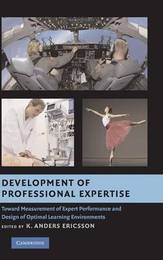
|
Development of Professional Expertise: Toward Measurement of Expert Performance and Design of Optimal Learning Environments
Hardback
Main Details
| Title |
Development of Professional Expertise: Toward Measurement of Expert Performance and Design of Optimal Learning Environments
|
| Authors and Contributors |
Edited by K. Anders Ericsson
|
| Physical Properties |
| Format:Hardback | | Pages:570 | | Dimensions(mm): Height 229,Width 155 |
|
| ISBN/Barcode |
9780521518468
|
| Classifications | Dewey:153.9 |
|---|
| Audience | | Professional & Vocational | |
|---|
| Illustrations |
21 Tables, unspecified; 17 Halftones, unspecified; 34 Line drawings, unspecified
|
|
Publishing Details |
| Publisher |
Cambridge University Press
|
| Imprint |
Cambridge University Press
|
| Publication Date |
22 June 2009 |
| Publication Country |
United Kingdom
|
Description
Professionals such as medical doctors, aeroplane pilots, lawyers, and technical specialists find that some of their peers have reached high levels of achievement that are difficult to measure objectively. In order to understand to what extent it is possible to learn from these expert performers for the purpose of helping others improve their performance, we first need to reproduce and measure this performance. This book is designed to provide the first comprehensive overview of research on the acquisition and training of professional performance as measured by objective methods rather than by subjective ratings by supervisors. In this collection of articles, the world's foremost experts discuss methods for assessing the experts' knowledge and review our knowledge on how we can measure professional performance and design training environments that permit beginning and experienced professionals to develop and maintain their high levels of performance, using examples from a wide range of professional domains.
Author Biography
K. Anders Ericsson, PhD, is presently Conradi Eminent Scholar and Professor of Psychology at Florida State University. For the last thirty years he has studied the development of expert performance in domains such as music, chess, medicine, business, and sports, and how expert performers attain their superior performance by acquiring complex cognitive mechanisms and physiological adaptations through extended deliberate practice. He has edited several books on expertise, such as Toward a General Theory of Expertise (1991), The Road to Excellence: The Acquisition of Expert Performance in the Arts and Sciences, Sports, and Games (1996), and the influential Cambridge Handbook of Expertise and Expert Performance (2006). His research has been recently featured in New York Times, Scientific American, Fortune Magazine, New Scientist, and Time magazine. He is also a Fellow of the American Psychological Association, the Association of Psychological Science, and the Center for Advanced Study in the Behavioral Sciences.
Reviews"This edited volume on expertise is unique in its dual focus not only on professional performance, but also on the objective measurement of professional performance. Moreover, professional performance is studied and discussed throughout the chapters not in the context of traditional sterile laboratory settings, but in the context of actual professional settings. This authentic context requires scholars and practitioners to address factors that are ignored in laboratory settings, such as the dynamics of professional performance, changing conditions, and high-stakes stress. Striving toward objective criteria for measuring expert professional performance also requires the identification and analyses of representative tasks that are valid in professional practice. This welcome focus on objective measurement of professional performance should lead to insights about transfer, innovation, and novel ways to develop training and practice activities. This comprehensive volume is a must-read for anyone interested in superior performance in professional settings." - Micki Chi, Arizona State University "When I first read the work of Anders Ericsson, it changed forever the way I thought about the meaning and importance of talent. No one has done more to deepen our understanding of what it takes to master a task." - Malcolm Gladwell "This book has many fascinating chapters on the latest developments in training, including training design, technological breakthroughs, what effective training involves, how much time needs to be spent on various types of training, how training is used successfully in different domains, especially the military, and performance measurement. This is a cutting edge book; the best chapters really move the field forward." - Edwin A. Locke, Emeritus, University of Maryland "If you want to learn about the science of expertise as well as what experts do to develop and maintain their expertise - this is the book to have! Anders Ericsson has created a wonderful gem; a one-of-a-kind source that clearly highlights the thinking, the research, and the practical principles generated from the study of expertise. For those in organizations that are concerned about developing and managing talent and competencies in their workforce - this is a must-read!" - Eduardo Salas, University of Central Florida "...offer the interested reader an excellent example of the work under way in fields like the military, medicine, scientific labs, and other industrial and academic areas... This volume, which follows closely on the publication of the Cambridge Handbook of Expertise and Expert Performance (Ericsson et al., 2006), brings together [the] leading researchers, practitioners, and engineers... Development of Professional Expertise represents yet another in a long line of important contributions by K. Anders Ericsson to our understanding of human learning." - Howard T. Everson, PsycCRITIQUES
|